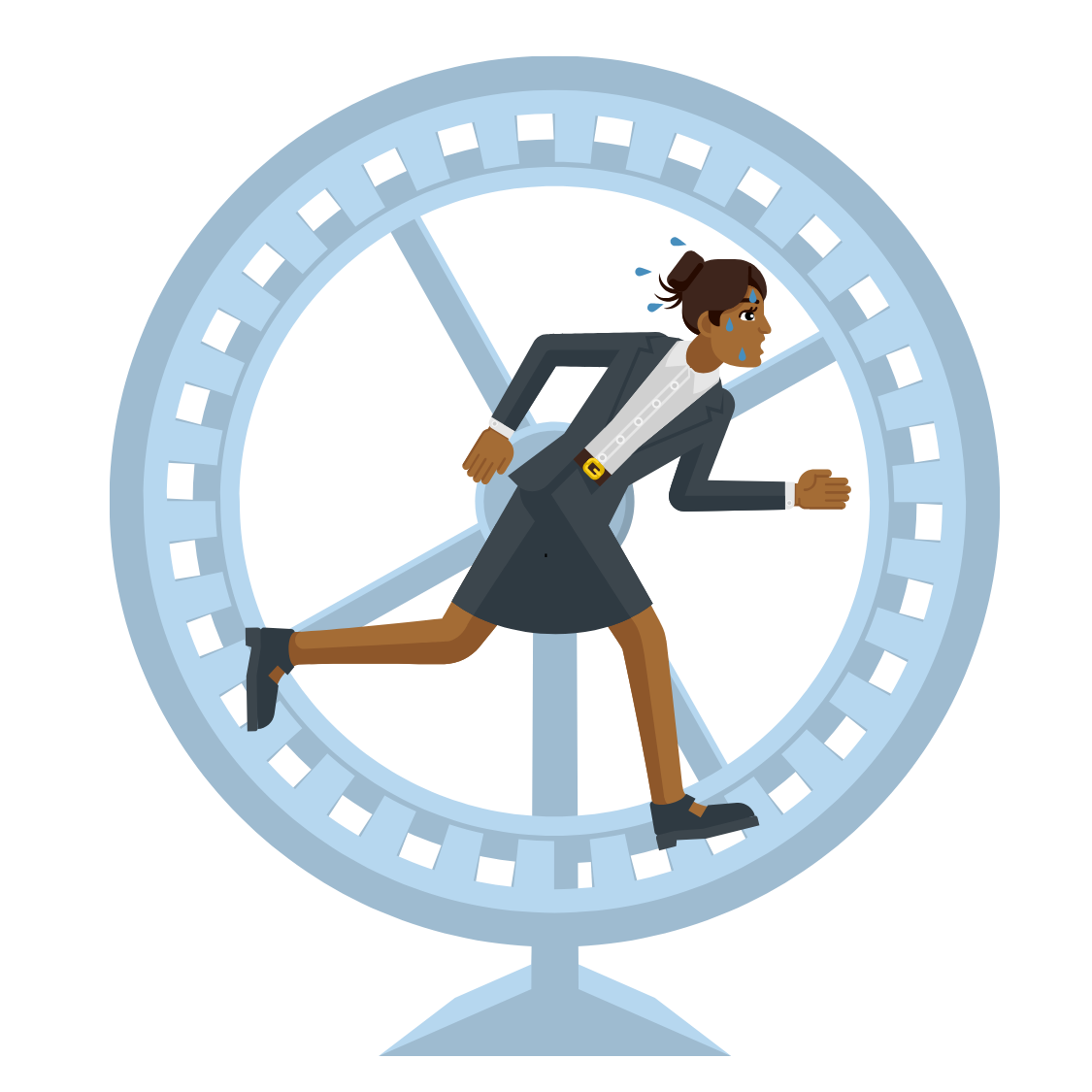
I love doing laundry. Well, actually I love folding laundry. Why? Because it’s one of the only times I can justify watching television – I’m multi-tasking and letting my brain go on vacation. But it got me thinking…so often 2e brains are stuck in what I call (cue the dramatic music) “The Spin Cycle!” This is when we perseverate, we are stuck, we keep going around and around and around about something that is bothering us, or that we can’t quite get the way we want it to go, or we’re thinking about something that keeps us from moving forward. This happens to gifted and distractible adults, gifted and distractible kids, and their teachers.
The 2e Adult Spin-Cycle
It’s due date time. You’re supposed to hand something in (at work), complete something (grocery shopping), or you want to respond in a social situation and you’re stuck. Perfectionism strikes, and you aren’t ready to hand in the work-product. You know in your belly that it could be better. After all, you see it in your mind’s eye – exactly what it’s supposed to look like. You worry that your colleague will do a better job or your boss will judge you, you’re afraid of not meeting expectations. You’re sick and tired of hearing “you’re not meeting your potential.”
First of all, I despise the word “potential.” I call “potential” a dirty little word. After all, whose potential? It’s so judgmental and shame-y, and why does someone else get to define our potential? Nevertheless, we’re stuck in the spin cycle. We can’t move through and move on. And that is damaging. It’s damaging to our own self-concept, our ability to do our jobs, and it kills creativity.
Do you ever find yourself in the grocery store putting things in your cart, taking them out, visualizing that dinner you want to make but trying just too hard to figure out all the things you want to include? Maybe not. But I do. What usually happens is I load up the cart with all the things, and inevitably I end up throwing out fruits and vegetables that go bad. (Shhh, don’t tell my husband.) To stop my own spin cycle I just throw more things in the cycle. That’s not an ideal solution either. In my attempt at the perfect dinner party, I overthink, overestimate, and over buy.
Now for the real doozy. Social situations. You’re with a friend, family member, or acquaintance, they say something that feels like a back-handed compliment and at the time you feel like a deer in headlights. Nodding, smiling, and…wait, whaaaaat? It’s too late you didn’t have the pithy comeback; you didn’t ask for clarification or explanation. And now you’re in the spin cycle. Wondering what the heck did they mean? How dare they! I can’t believe they said that!
These examples all beg the question, what do you do to move through the spin cycle – get yourself rinsed off and in the warm, cozy dryer?
Let’s take a look at what happens for 2e parents before we answer that question.
The 2e Parent Spin Cycle
It’s parent-teacher conference time. Your beautiful 2e kid has been misunderstood all year long and now you have to figure out how to cram in all you want to say for a 10 minute meet and greet. You draft, rewrite, think, discuss, prioritize and re-prioritize what you want to say. You’re understandably emotional, you’re frustrated, and likely, you’re exhausted. You spend so much time thinking about what to say that you never actually land on the mission, or goal that you want to accomplish.
Your child isn’t getting the accommodations she needs to access the curriculum but the teacher doesn’t understand your child’s invisible disabilities. You hear a lot of “shoulds;” “your kid is gifted, she should be able to do that,” “your kid is so smart, she’s playing you,” or the teacher doesn’t see your child’s giftedness and states, “your kid has a disability – why are you pushing so hard?” Slap yourself on the forehead and enter the spin cycle – the intense emotions that make you want to rage at the world. You’re stuck in your emotions and can’t enter your thinking brain to hatch a collaborative advocacy plan to help the teacher understand and to constructively push back against her lack of knowledge. Rather than getting your child the accommodations and enrichment she needs, you further alienate the educator and become even more angry.
How about those times when you JUST. WANT. YOUR. KID. TO. DO. THE. THING? You know, brush their teeth, pick up their laundry, put the dish in the dishwasher, do the homework, get off the device. But it’s a knock-down-drag-out fight. You remind. You scold. You beg. You bribe. You plead. You yell. This is a spin cycle you are having difficulty getting out of; you’re just trapped in a power struggle spiral. How do you get out of this never ending loop?
Before I answer that, let’s take a look at how teachers enter the spin cycle.
The 2e Teacher Spin Cycle
Your 2e student is so bright. She makes immediate connections and in some cases, processes faster than you can share out facts and information. But so often she doesn’t hand in her homework. You don’t get it and you think – in order for her to learn, she needs to suffer a consequence. Maybe. But this is a typical teacher spin-cycle. We think fear is the fastest way to modify behavior – and maybe it is the fastest but is it the best? Does it get us to our goal of educating and teaching skills? I’m not so sure. The spin cycle here is a voice in the teacher’s head saying, I have to treat her the same as everyone else. I can’t give her advantages. Of all my pupils, she should be the one who this is easiest for. We are caught in a spin cycle of “shoulds” that aren’t appropriate for 2e learners.
Or maybe our student doesn’t engage, disrupts, or is oppositional. We decide we have to address behaviors rather than the trigger causing the behavior. This is a very common spin cycle. I can’t afford this child any leeway because his behavior is so awful. I can’t give this kid any enrichment or privileges because I’ll be rewarding exactly what I want to discourage. This spin cycle only leads to more challenging behavior. It doesn’t give the respect to a child who is maladaptively responding to a challenge. Whether he’s affected by sensory stimulation, he’s emotionally distraught from an earlier experience, or he is saving face because a learning difference is making what you’re asking him to do harder than it should be, this child needs understanding, not reprimanding.
What’s a teacher to do?
Stopping the Spin Cycle
Here are the steps to stop your spin cycle, whether you are a 2e adult, 2e parent, or 2e teacher.
- Take stock. What are the facts here and now? What does your rational brain know is relevant to this moment. When you focus on the current – it can help you distinguish between “dead facts,” things that might have occurred but are no longer relevant, and “facts that matter” – the things that will help you move forward with your challenge.
- Temper your temper. Breathe. Close your eyes. Concentrate on your body. Is there anywhere you are holding stress? Are you experiencing any pain? As an excellent book says, The Body Keeps the Score. Use this reconnaissance to breathe through the stress and try to relax your body and your mind. This helps you to think clearly and focus on your goal or mission.
- State your goal or mission. What exactly are you trying to accomplish? Are bad facts and emotions standing in your way? Consider what actions will serve that goal or mission.
- Take a break. Now that you have your goal or mission and you’ve calmed your nervous system, take a break. Do something you love or is relaxing for you (take a bath, take a run, or fold laundry and watch a show!) Then get back to your problem solving with a refreshed and relaxed mind.
- Limit yourself to identifying three actions:
- acknowledge – state the problem,
- identify concise actions that move you toward that goal
- create boundaries – what is the first thing you will say that is concise and clear as to what your position is, or what you want to do.
When we are in the spin cycle, we are ostensibly out of control. The five steps and three actions above will guide you gently out of your spin cycle and result in a fresh clean approach to your dilemmas whether they are work-related, social-emotional, or productivity based.

Author: Julie F. Skolnick M.A., J.D.
Julie Skolnick, M.A., J.D., is the Founder of With Understanding Comes Calm, LLC, through which she passionately guides parents of gifted and distractible children, mentors 2e adults, and collaborates with and advises educators and professionals on bringing out the best and raising self-confidence in their students and clients.

